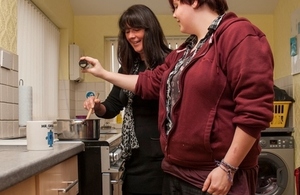Ofsted publishes state of the nation picture on foster care
Foster care provision statistics published today take a broad look at fostering provision across the country.

Today (10 December 2015) Ofsted has published a state of the nation picture of foster care provision in England.
The annual statistics (April 2014 to March 2015) take a broad look at fostering provision across the country. They include data on children, their characteristics, experiences and safeguarding; capacity, including types of places and occupancy rates; foster carers, including ethnicity and training; recruitment and retention of foster carers; as well as complaints and allegations of misconduct.
The data allows for comparison between local authority and independent fostering services as well as by region. The inspectorate received responses from 152 local authority fostering services and 293 independent fostering agencies (IFAs).
Key findings include:
-
more children and young people were in foster care: there were 85,890 children and young people placed in foster care over the time period, an increase of 2% from 2013-14
-
there were fewer fostering households overall, but more family and friends households: there were 36,890 fostering households, a decrease of 1% from the same date in 2014. In the same period, the number of family and friends households increased by 6% to 4,145.
-
more young people remained living with their foster carer after their 18th birthday: there were 1,790 young people aged 18 and still living with their foster carers in 2014-15 under “Staying Put” arrangements – this was an increase of 2% from the previous year
-
more children were recorded as missing from placements and going missing more often: there were 5,055 children recorded as missing in 2014-15, an increase of 19% from the previous year. The number of times that children were recorded as going missing increased by 29%, to 17,175.
For the first time, Ofsted also asked services for data on child sexual exploitation (CSE) and children in foster care. 3% of children and young people were reported as being at risk of CSE during the year (2,690), while 1% were reported to be subject to it (865).
Ofsted’s National Director for Social Care, Eleanor Schooling said:
This publication includes a wealth of data on local authority and independent fostering services, which we hope will contribute to the overall understanding and improvement of the system.
The slight rise in children being placed in foster care again shows that it continues to be a valued choice of care for vulnerable young people, but also the ongoing need to recruit and retain more foster carers to meet increasing demand. We know that many children go on to have vastly improved outcomes from the care and support they receive.
Young people tell us that the transition to independence can be a difficult time, so it’s heartening to see a rise in the number remaining with their foster carers past the age of 18. This affords much needed stability at an important stage in their lives.
We continue to see an increase in the number and frequency of children in foster care who go missing. While the rise may be a result of better recording and awareness from services, this remains an issue of concern given the grave risks associated with children who go missing.
Notes to editors
-
The data release is available on the Ofsted website.
-
The Office for Standards in Education, Children’s Services and Skills (Ofsted) regulates and inspects to achieve excellence in the care of children and young people, and in education and skills for learners of all ages. It regulates and inspects childcare and children’s social care, and inspects the Children and Family Court Advisory and Support Service (Cafcass), academies, colleges, initial teacher training, work-based learning and skills training, adult and community learning, and education and training in prisons and other secure establishments. It inspects services for looked after children, safeguarding and child protection.
-
Media can contact the Ofsted Press Office through 03000 130415 or via Ofsted’s enquiry line 0300 1231231 between 8.30am – 6.00pm Monday – Friday.
-
‘Staying put’ is a duty on local authorities in England which came into force in May 2014 as part of the Children and Families Act 2014. This requires local authorities in England to facilitate, monitor and support staying put arrangements for fostered young people until they reach the age of 21, where this is what they and their foster carers want, unless the local authority consider that the staying put arrangement is not consistent with the welfare of the young person. The DfE/Children’s Partnership’s good practice guide (pdf) gives more information.